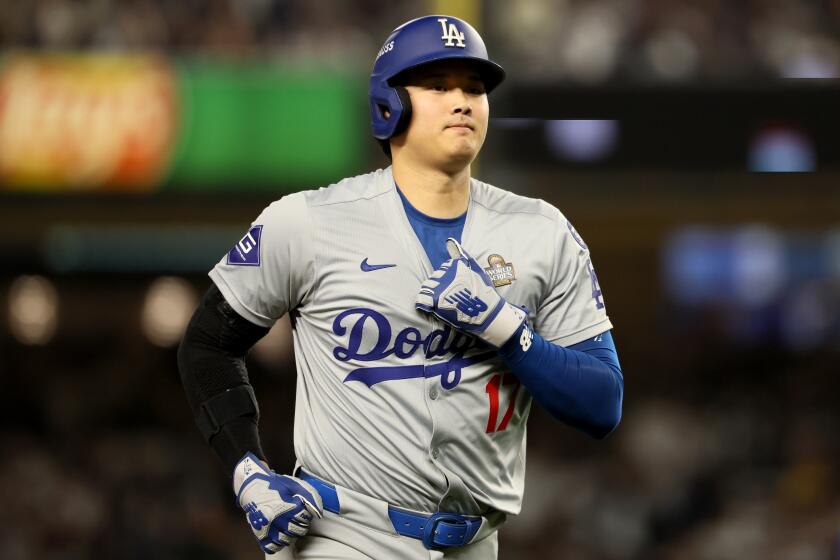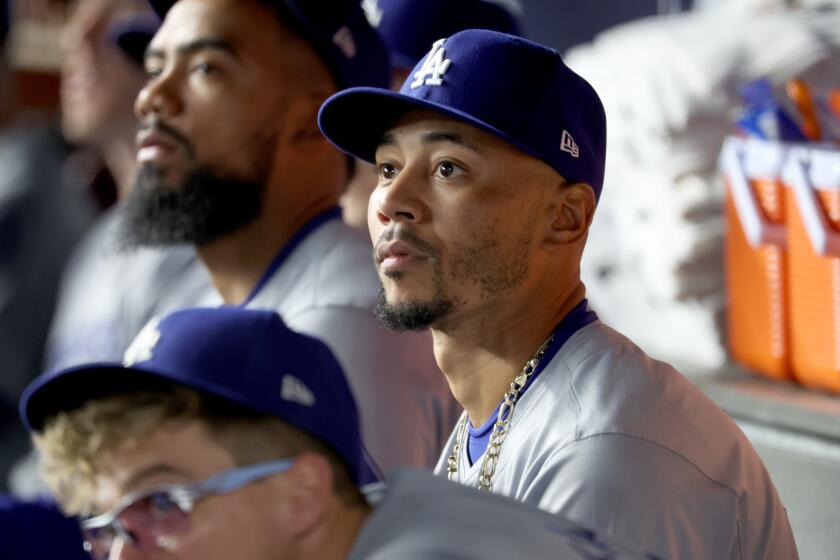Dodger Star Will Observe, and Play on, Yom Kippur
SAN DIEGO — After wrestling for weeks with an impending collision of faith and work, Dodger slugger Shawn Green said Thursday that he would play in one of two crucial games scheduled this weekend during Yom Kippur, Judaism’s holiest observance.
“I talked with family and friends and got advice from a lot of people. When it came down to it, I realized that I just had to do what I feel is right and what’s most consistent with my beliefs,” Green said. “Everyone has different ways of expressing their beliefs. For me as a Jewish person and a teammate, I feel that this is the right decision for me.”
Green, one of the Dodgers’ biggest stars, will play tonight and sit out Saturday’s 1 p.m. game at San Francisco as the Dodgers seek to maintain their narrow hold on first place in the National League West. The Dodgers, who have not reached the playoffs since 1996, have spent much of the season in first place, fueling the hopes of fans who have turned out at Dodger Stadium in near-record numbers.
Green’s decision recalls one by Sandy Koufax 39 years ago in which he sat out the first game of the World Series, also because of Yom Kippur.
The holy day begins at sundown tonight and ends at sundown Saturday, a period that Jewish law says should be devoted to prayer and self-analysis. Jews are required to abstain from work and any forms of pleasure, including eating and drinking. Green said he would begin fasting at sundown tonight.
Because Yom Kippur often arrives after the baseball season is over, and because there are only about 10 Jews in the major leagues, few players ever face such a wrenching choice.
This week, Green had told teammates and club officials he probably would sit out only Saturday, then wavered, suggesting he might skip both games. “I’m trying to do the right thing, and it’s hard to know what that is,” he said Wednesday. But in a news conference at Petco Park before Thursday night’s game with the San Diego Padres, Green said his final decision was the correct one.
“I struggled with it. I definitely learned a lot through the experience, how important it is to do what you feel in your heart,” he said. “Everyone can have their opinions, but religion is your relationship with God and how you want to handle it.”
Although there has been support for Green’s decision in the Jewish community, it has not been universal.
“I respect Mr. Green’s commitment to the team,” said conservative Rabbi Charles Savenor, associate dean of the Jewish Theological Seminary in New York. “It’s impressive to see his connection to the club, but I implore him to reconsider his choice as to how to observe Yom Kippur. There are so few opportunities that people have in this world to make a public statement as to who they are and what they are. This is half a statement, and half a statement doesn’t really say anything. It sort of misses the point.”
Although not responding directly to Savenor’s comments, Green said he was prepared for criticism.
“I accept that,” he said. “If someone is going to be upset with me handling this in a way that reflects my views and my religious beliefs, then so be it. I can’t worry about that.”
Others were more accepting.
“Who are we to judge another person’s decisions? Each person has to grapple with what their faith means to them,” said Rabbi Richard Camras of Shomrei Torah Synagogue in West Hills, a conservative congregation.
“As a fellow human being, it’s not for me to pass judgment. As a rabbi, I have to say that our tradition requires one on Yom Kippur to be in the synagogue with their fellow congregants. I think Shawn Green has been clearly conflicted.”
Said Rabbi Asher Biron of the orthodox Valley Torah High School in North Hollywood, “We would have preferred that Shawn hit one out of the park by totally observing the sanctity of the 25-hour period of Yom Kippur, but credit must nevertheless be given to him for at least hitting a sacrifice fly.... Green has shown, on his level, commitment to the holiness of the day and identification with his people.”
Green also received approval from his teammates. “I support him 100%,” pitcher Eric Gagne said. “If he would have sat out two games, that’s also fine with me. You cannot make a judgment on family and religion.”
Added third baseman Adrian Beltre: “Everyone understands how hard this was for Greenie. He wants to help the team, but this is something that’s very personal for him. He’s a big part of the lineup, so it’s good to have him out there for that first game. We need him.”
Green, a 31-year-old outfielder-first baseman, has been an important part of the team’s revival under owner Frank McCourt, who bought the team from News Corp. in January. Green has 27 home runs, including a dramatic blast Sunday with two outs in the ninth inning and a no-ball, two-strike count that beat Colorado, 7-6. Although Green’s home run total is far short of the club-record 49 he hit in 2001, it represents a rebound from last season, when, plagued by an ailing shoulder, he hit 19.
In addition to being the Dodgers’ highest-paid player, receiving $16 million this season, Green is among their most durable. He has missed only 10 games since joining the team in 2000 as a free agent from the Toronto Blue Jays. He had played in 415 consecutive games, then the longest active streak in the major leagues, until skipping the 2001 game on Yom Kippur.
That marked the first time in his career that the holy day had conflicted with a game. The Dodgers, trailing Arizona by 3 1/2 games at the time, lost to the Giants, 6-4.
The clash of priorities is one that Jewish ballplayers -- there have been 143 in major league history, according to Associated Press -- have wrestled with for decades.
Koufax skipped Game 1 of the 1965 World Series, attending Yom Kippur services in a St. Paul, Minn., synagogue, according to reports at the time. Although the team lost that day to the Minnesota Twins, 8-2, his decision was an inspiring expression of faith to a generation of Jews who grew up enthralled by the Hall of Fame left-hander, said longtime Dodger fan Zev Yaroslavsky, a Los Angeles County supervisor.
“I had a teacher who, when I asked for time off for the Jewish high holidays, asked me only partially tongue in cheek: ‘How do I know you are not going to the beach?’ ” Yaroslavsky said. “After that 1965 World Series, that teacher never asked that question again. Koufax had set the standard.
“Every Jewish kid swelled with pride. It was a liberating experience for Jewish kids. They didn’t have to look over their shoulder anymore when taking off for the holiday because Koufax did it.”
The Dodgers went on to win the series in seven games, with Koufax pitching the finale.
For him, there was no debate. He would never play on Yom Kippur.
Although Koufax says he and Green haven’t discussed Green’s decision, Koufax thinks it was tougher for Green than it had been for him.
“He’s an everyday player,” Koufax said. “When I couldn’t pitch, they could move me around in the rotation.”
Decades earlier, Hall of Famer Hank Greenberg of the Detroit Tigers did not play on Yom Kippur during the 1934 pennant race. Steve Greenberg, Hank’s son, recalled the pride his father felt when he went to a synagogue instead.
“He said one of the two or three most memorable moments in his career was when he walked into the temple on Yom Kippur and received a standing ovation,” the younger Greenberg said Thursday.
Steve Greenberg recalled that his father’s decision was heralded a year later in a poem by Edgar A. Guest that ended, “We shall miss him in the infield and shall miss him at the bat, but he’s true to his religion ... and I honor him for that!”
Springer reported from Los Angeles, Reid from San Diego.
More to Read
Are you a true-blue fan?
Get our Dodgers Dugout newsletter for insights, news and much more.
You may occasionally receive promotional content from the Los Angeles Times.









